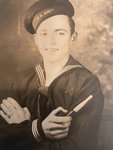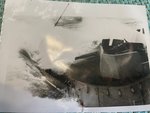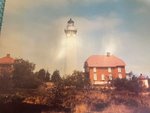Veteran Bud Stefanko was forced to join the Navy at 17.
Join our family of readers for as little as $5 per month and support local, unbiased journalism.
Already have an account? Log in to continue. Otherwise, follow the link below to join.
Please log in to continue |





OKEECHOBEE — Veteran Robert "Bud" Stefanko was born in Cleveland, Ohio but brought up west of Pittsburgh in the coal mining district. The day he turned 17, his father took him down and put him in the Navy. He said, “I can’t do nothing with you. Maybe they can.”
After Stefanko’s mother passed away when he was only 4 years old, his father remarried, but this wife ended up in a mental institution, and by the time he was 15, Stefanko spent most of his time living alone. “My dad was a bit of a rouser,” he explained. “He had a lady friend and wanted to move to Florida. I think that’s why he put me in the Navy. He got rid of me, and took her to Florida.”
He went to basic in Bainbridge, Md. He went in as a deckhand/seaman, but soon applied for the position of signalman and was chosen. He did this for a few months, and one day, he was out on the flight deck by himself. A bomber’s tail hook did not catch the cable on the flight deck. “He came up the side and hit the stacks and the bridge. He was coming straight for me! I ran inside to go up the hatch, but somebody had dogged the hatch down. I pissed my pants I was so scared! After it was over, I went up on the bridge screaming and hollering.”
A couple weeks after that incident, Stefanko was up on the bridge when the bugler came out. “I asked him if it was hard to blow, and he said it wasn’t that hard. He asked me if I’d ever blown a bugle before, but I told him I played the clarinet and the saxophone in school.” Stefanko gave it a try and found he could blow the calls. The bugler told him he was getting discharged and Stefanko could be the new ship’s bugler. Stefanko did not want to be a bugler, because you had to be a quarter master. This meant you were on the bridge of the ship around all the officers. “The whole function of the ship is on the bridge, and I didn’t want to be there.” They did not give him a choice though. He was the bugler for three years. “I did not get much rest. I put them to bed at night and got them up in the morning. I blew bugle calls all day.”
He spent three and a half years in the Navy on an aircraft carrier in Pensacola. “We trained and qualified pilots. After they trained with us, they went to bomber school. After that, they came back aboard our ship to qualify with a war plane.” Stefanko joined the Navy right before WWII hostilities ended, and they were involved in submarine warfare.
Stefanko got married while he was in the Navy. He was 18 years old. The marriage did not work out though, so when he was discharged from the Navy, he went to Youngstown, Ohio to work for Republic Steel. He worked as a pipe fitter for about six months. He decided to move to Detroit, where his brother lived, and went to work for Kaiser-Frazer Car Company. He worked there for a couple months but was laid off when business slowed down. He went to work for Great Lakes Steel. They manufactured quonset huts. “It was the most monotonous job I ever had in my life.” When that company closed down, he went to work in the main mill as a laborer in the open-hearth furnaces. We produced 500 tons of steel every 24 hours. I was about 120 pounds. I worked with great big guys, 200 or more pounds.”
After the Korean War started, he decided to join the Coast Guard. He wanted to go on landing craft and figured that would be the way to do it. It did not work out that way though, because they used Army landing crafts. He was sent to Cleveland and then to Cheboygan, Mich. to work on an ice breaker. They had to break the ice for the ore boats.
Stefanko played country music on the guitar and his lieutenant used to haul him all over to the different bars after hours, and they would sit and drink beer and play guitar. Stefanko did not get along with the chief boatswain’s mate, and he told the lieutenant he had to get off that boat or he and the chief would get into it. “He was used to having kids out of boot camp, and I already put in three and a half years in the Navy.”
Stefanko had even put in brig time while in the Navy after being court martialed for going over the hill. He went to his grandmother’s funeral but then did not go back when he was supposed to. He was sentenced to 10 days in the brig on piss and punk (bread and water). “I had a few captain’s masts too because I had a temper.”
He transferred to a lifeboat station position in Marquette, Mich. and was there for about a year. He got his rate as a third class boatswain’s mate which is an E-5 rate.
At one point, he was sent to a buoy tender. There were about 20 lighthouses they had to check on, some manned and some not. He had trouble with a warrant officer on this vessel. They just didn’t get along. He was a China Chief from WWII and was an alcoholic. One day, Stefanko asked if he could leave the ship to visit his wife overnight and meet the ship the next day when it came into port. The warrant officer would not let him go ask the executive officer for permission, and Stefanko went over the hill again. Stefanko’s punishment for this infraction was to be restricted to the ship. “We were out on the water anyhow,” he laughed. A week later, that warrant officer was off the ship.
As a third class boatswain’s mate, he ran the deck. He wasn’t happy about it, but he ran 15 men servicing all the lighthouses on Lake Superior. He ended up with a bleeding ulcer and was transferred to Minnesota. It was time for him to be discharged and he asked if he was ever going to be advanced in rate. They told him he was never moving up because he had gone over the hill, so he decided to get out of the service.
He went to work in the steel mill and stayed there for 17 years. When the trouble with Cuba started, he joined the Air National Guard but hated it. He was a heavy equipment operator at the mill, but the Air National Guard stuck him in an office. He was a delivery boy and bored out of his mind.
In all, his military career consisted of three and a half years in the Navy, three years in the coast Guard, three years in the Coast Guard Reserves and one year in the Air National Guard.
Stefanko’s brothers both served in the Navy as well.
There were two very unusual things that happened after he left the service. He served with a man in the Navy, and many years later ended up living right next door to him. They were very surprised to see each other. The second odd thing was that his sister called to tell him she was engaged, and it turned out to be another man he had served with.
Stefanko and his wife, Marilyn have been married since 1953 and have two sons. He enjoys fishing but is not able to do as much of it anymore. Reading is another favorite pastime and he reads three or four books a week.